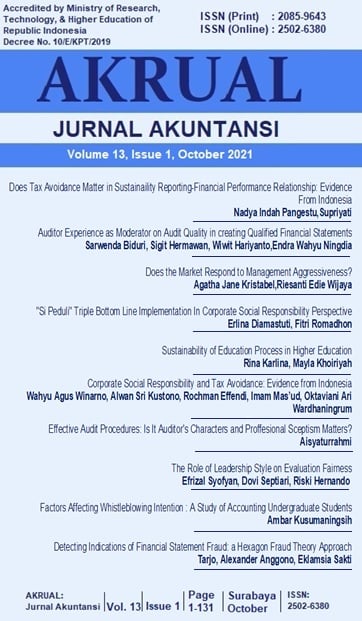Effective Audit Procedures: Is It Auditor's Characters and Proffesional Sceptism Matters?
DOI:
https://doi.org/10.26740/jaj.v13n1.p83-93Abstract
The aim of this study is to examine the auditors characteristics and the selection of effective audit procedures by introducing professional scepticism as an intervening variable. In this study the author focuses on gender, experience and personality type. We examine to what extent such characteristics influence the selection of effective audit procedures. We conducted a survey for practitioners who actively work in the public accountant firms in East Java province. The results show that professional scepticism which is treated as an intervening variable do not play role on the relationships between gender and experience and the selection of effective audit procedures. In contrast, it help us to explain the relationships between personality type and the selection of effective audit proceduresReferences
AICPA.(2002). Statement on Auditing Standards
Carpenter, T. D., & Reimers, J. L. (2007). Professional Skepticism: The Effect of Tone at the Top and Individual Skepticism on Frund Risk Assessments and on Identified Audit Procedures.
Engko, Cecilia, & Gudono. (2007). Pengaruh Kompleksitas Tugas danLocus of Control Terhadap Hubungan Antara Gaya Kepemimpinan dan Kepuasan Kerja Auditor. In Simposium Nasional Akuntansi X. Makassar
Fullerton, R., & Durtschi, C. (2005). The Effect of Professional Skepticism on the Fraud Detection Skills of Internal Auditors.
Gusti, M., & Ali, S. (n.d.). Hubungan Skeptisisme Profesional Auditor Situasi Audit, Etika, Pengalaman, serta Keahlian Audit dengan Ketepatan Pemberian Opini Auditor oleh Akuntan Publik. In Simposium Nasional Akuntansi XI. Pontianak.
Herbert, L. (1979). Auditing the Performance of Management.California: Lifetime Learning Publications.Indonesia, I. A. Standar Profesional Akuntan Publik (2020).
Jamilah, S., Fanani, Z., & G, C. (2007). Pengaruh Gender, Tekanan, dan Kompleksitas Tugas terhadap Audit Judgment. In Simposium Nasional Akuntansi X. Makassar.
Libby, R. (1995). The Role of Knowledge and Memory in Audit judgment. In Judgment and Decision-Making Research in Accounting and Auditing. ( and A. A. R. Ashton, Ed.). New York: Cambridge University Press.
Malone, C. F., & Robberts, R. . (1996). Factors Associated With The Incidence of Reduced Audit Quality Behaviors. Auditing: A Journal of Practice and Theory, 15.
Sian, S., Agrizzi, D., Wright, T., & Alsalloom, A. (2020). Negotiating constraints in international audit firms in Saudi Arabia: Exploring the interaction of gender, politics and religion. Accounting, Organizations and Society, 84, 101103. https://doi.org/10.1016/j.aos.2020.101103
Sumardi, & Hardiningsih, P. (2002). Pengaruh Pengalaman Terhadap Profesionalisme Serta Pengaruh Terhadap Kinerja dan Kepuasan Kerja. Jurnal Bisnis DanEkonomi., 9.
Downloads
Published
How to Cite
Issue
Section
License
Copyright (c) 2021 AKRUAL: Jurnal Akuntansi

This work is licensed under a Creative Commons Attribution-NonCommercial 4.0 International License.
 Abstract views: 414
,
Abstract views: 414
, PDF Downloads: 397
PDF Downloads: 397


















